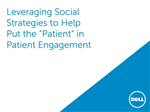Hesitating to use social media in patient engagement? You’re not alone. Social media can be an extremely useful tool in healthcare, especially in the realm of patient engagement. Through social media listening, you can learn more about your patients and the health of your community. Through posts and interactions on social media, you can inform, engage and build patient loyalty. While many healthcare organizations have made small steps toward using social media, most have only dipped a toe in the water. So what’s holding them back?
In a recent webinar on using social media for patient engagement, we asked participants that question. The answers we saw in the webinar mirror what we’ve heard elsewhere across the industry: the biggest barrier is just not knowing how to get started.
It turns out this lack of expertise, and a fear of doing it wrong, are as big a barrier to effective use of social media as worries about security and the possibility of a HIPPA violation. No organization wants to stub its toe in public, and messing up on social media can be a very public event. Hesitations about using social media are not unlike fears of public speaking. And like public speaking, the best way to get over your fears and do it well is to be prepared.
Governance and staff training are good first steps
At Dell, we’ve used social media for customer engagement for the better part of the last decade. From that experience, we’ve learned that good governance and education are two of the most important tools. You need leadership and a set of rules to guide your efforts, and you need to make sure that all staff engaged in social media know the rules.
The rules don’t need to be complex. Respect, courtesy, and honesty should always be the guiding principles. For healthcare, maintaining patient privacy in health matters is also key.
At Dell, we require that all staff who engage in social media on behalf of Dell earn certification through a set of classes that teach the rules of the road and best practices for effective engagement. Staff members also get a chance to practice their skills and discuss likely scenarios in the class, so that they are comfortable with the process before they do it in real life.
Don’t be afraid to ask for help
If you don’t have anyone on staff who is expert in social media, a good consultant can guide your efforts at establishing governance and provide training for your staff. Once you’ve established the basics, you can quickly build your social media presence and engage effectively with your patients and your community.
 If you’d like a deeper dive into using social media for patient engagement, you can listen to the webinar Leveraging Social Strategies to Help Put the “Patient’’ in Patient Engagement and read Six Top Benefits of Social Media in Healthcare and UBM’s report on The State of Social Media in Healthcare.
If you’d like a deeper dive into using social media for patient engagement, you can listen to the webinar Leveraging Social Strategies to Help Put the “Patient’’ in Patient Engagement and read Six Top Benefits of Social Media in Healthcare and UBM’s report on The State of Social Media in Healthcare.
